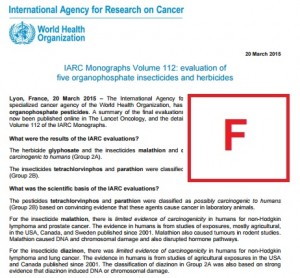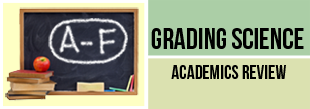IARC glyphosate cancer review fails on multiple fronts
The International Agency for Research on Cancer Monograph evaluation of certain insecticides and herbicides earns an F grade for failure to consider all the available studies, placing weight on weak and discredited studies (several in the advocacy community are already using this report claiming it is a vindication of the discredited Seralini GMO cancer claims), and most importantly failure to consider if glyphosate is a carcinogen at the doses to which consumers would normally be exposed.
It would require doses of hundreds or even thousands of times higher throughout a lifetime–a highly unlikely event–for even a single case of cancer to be caused by glyphosate. Many commonly encountered substances including coffee would fall into the same carcinogenic category if evaluated using the IARC flawed approach to this report. Experts around the globe have objected to IARCs reclassification of glyphosate.
The greater concern here is that it appears that IARC has been unduly influenced by anti-chemical activists who have persuaded it to take a politically popular hazard-based decision which is inconsistent with the weight of evidence and the underlying science. Agencies like IARC have an important role to play. It is shameful when that role is undermined by special interests for political objectives.
See also: Debunking pseudo-science risk claims about glyphosate.
What others are saying about the IARC pesticide monograph:
-
Canadian toxicologist pans UN IARC glyphosate report claiming they made critical error interpreting his research data.
- Harvard Microbiology and Immunobiology Curriculum Fellow blogs for Scientific American on GMOs, he believes GE technology is still the best means of feeding the world, points out that glyphosate is not as risky as the alternatives
- University of Wyoming plant scientist conducts literature review to better understand IARC classification of glyphosate as probable carcinogen, argues data doesn’t support decision
- GMO Answers points out many flaws in the recent IARC review which lists glyphosate as a probable carcinogen
- Forbes – Henry Miller questions methodology behind IARC classifications of glyphosate, four other pesticides as possibly or probably carcinogenic due to evaluation of potential hazard versus actual risk of toxicity; previews review of three more pesticides in June
- EurActiv criticizes the recent IARC publication on glyphosate as an “anti-industry witch-hunt,” pointing to the large body of research which demonstrates glyphosate is not harmful to humans
- University of Edinburgh plant physiology professor, Scientific Alliance Scotland member explains IARC glyphosate classification refers to occupational exposure, claims effect is marginal
- Genetic Literacy Project Andrew Porterfield criticizes IARC report that lists glyphosate as a probable carcinogen, believes the IARC report is not any cause for alarm, reaffirms the relative safety of glyphosate for humans
- Scientific Alliance member argues absence of public alarm suggests IARC glyphosate carcinogen classification is unimportant, likely affirmed preconceived notions of pesticide risks
- Gizmodo contributor says IARC did not find evidence of links between glyphosate and cancer despite ruling of chemical as ‘probable’ carcinogenic, noting scientific criticism of decision
- American Council on Science and Health criticizes Mark Bittman’s “rant” on GMO labeling and glyphosate’s updated IARC classification
- Reason.com predicts IARC’s ‘scientifically misbegotten’ ruling that glyphosate is a probable carcinogen will spur additional efforts from anti-biotech activists due to the chemical’s use on GM crops
- Real Agriculture criticizes recent media coverage of IARC pesticide carcinogenicity review, encourages readers to explore the full context before jumping to conclusions
Filed Under: Grading Science • News








